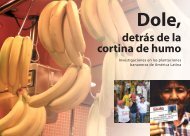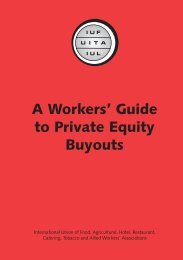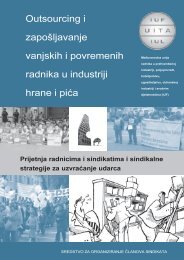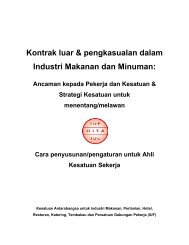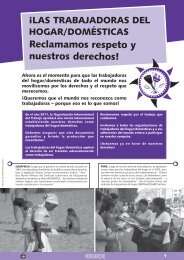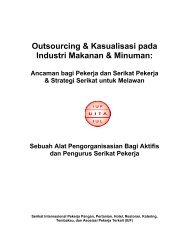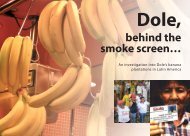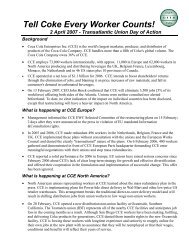- Page 1:
Health, Safetyand EnvironmentIntern
- Page 4 and 5:
Copyright © 2004 International Lab
- Page 6:
TeamMuch more than a department of
- Page 15 and 16:
FOREWORDRon Oswald, General Secreta
- Page 17 and 18:
IntroductionINTRODUCTION About this
- Page 19 and 20:
Introduction The global food chain
- Page 21 and 22:
IntroductionWhen national regulatio
- Page 23:
IntroductionAt national level, the
- Page 26 and 27:
Manual 1:AN EDUCATOR’S GUIDEFurth
- Page 28 and 29:
Manual 1:AN EDUCATOR’S GUIDECours
- Page 30 and 31:
Manual 1:AN EDUCATOR’S GUIDE“Le
- Page 32 and 33:
Manual 1:AN EDUCATOR’S GUIDE Tech
- Page 34 and 35:
Manual 1:AN EDUCATOR’S GUIDESmall
- Page 36 and 37:
Manual 1:AN EDUCATOR’S GUIDEActiv
- Page 38 and 39:
Manual 1:AN EDUCATOR’S GUIDECheck
- Page 40 and 41:
Manual 1:AN EDUCATOR’S GUIDERole-
- Page 42 and 43:
Manual 1:AN EDUCATOR’S GUIDEThe u
- Page 44 and 45:
Manual 1:AN EDUCATOR’S GUIDE Sett
- Page 46 and 47:
Manual 1:AN EDUCATOR’S GUIDEWhat
- Page 48 and 49:
Manual 1:AN EDUCATOR’S GUIDEEXAMP
- Page 51 and 52:
Manual 2:HEALTH, SAFETY & ENVIRONME
- Page 53 and 54:
Manual 2:HEALTH, SAFETY & ENVIRONME
- Page 55 and 56:
Manual 2:HEALTH, SAFETY & ENVIRONME
- Page 57 and 58:
Manual 2:HEALTH, SAFETY & ENVIRONME
- Page 59 and 60:
Manual 2:HEALTH, SAFETY & ENVIRONME
- Page 61 and 62:
Manual 2:HEALTH, SAFETY & ENVIRONME
- Page 63 and 64:
Manual 2:HEALTH, SAFETY & ENVIRONME
- Page 65 and 66:
Manual 2:HEALTH, SAFETY & ENVIRONME
- Page 67 and 68:
Manual 2:HEALTH, SAFETY & ENVIRONME
- Page 69 and 70:
Manual 2:HEALTH, SAFETY & ENVIRONME
- Page 71 and 72:
Manual 3:HEALTH, SAFETY & ENVIRONME
- Page 73 and 74:
Manual 3:HEALTH, SAFETY & ENVIRONME
- Page 75 and 76:
Manual 3:HEALTH, SAFETY & ENVIRONME
- Page 77 and 78:
Manual 3:HEALTH, SAFETY & ENVIRONME
- Page 79 and 80:
Manual 3:HEALTH, SAFETY & ENVIRONME
- Page 81 and 82:
Manual 3:HEALTH, SAFETY & ENVIRONME
- Page 83 and 84:
Manual 3:HEALTH, SAFETY & ENVIRONME
- Page 85 and 86:
Manual 3:HEALTH, SAFETY & ENVIRONME
- Page 87 and 88:
Manual 3:HEALTH, SAFETY & ENVIRONME
- Page 89 and 90:
Manual 3:HEALTH, SAFETY & ENVIRONME
- Page 91 and 92:
Manual 3:HEALTH, SAFETY & ENVIRONME
- Page 93 and 94:
Manual 3:HEALTH, SAFETY & ENVIRONME
- Page 95 and 96:
Manual 3:HEALTH, SAFETY & ENVIRONME
- Page 97 and 98:
Manual 3:HEALTH, SAFETY & ENVIRONME
- Page 99 and 100:
Manual 3:HEALTH, SAFETY & ENVIRONME
- Page 101 and 102:
Manual 3:HEALTH, SAFETY & ENVIRONME
- Page 103 and 104:
Manual 3:HEALTH, SAFETY & ENVIRONME
- Page 105 and 106:
Manual 3:HEALTH, SAFETY & ENVIRONME
- Page 107 and 108:
Manual 3:HEALTH, SAFETY & ENVIRONME
- Page 109 and 110:
Manual 3:HEALTH, SAFETY & ENVIRONME
- Page 111 and 112:
Manual 3:HEALTH, SAFETY & ENVIRONME
- Page 113 and 114:
Manual 3:HEALTH, SAFETY & ENVIRONME
- Page 115 and 116:
Manual 3:HEALTH, SAFETY & ENVIRONME
- Page 117 and 118:
Manual 3:HEALTH, SAFETY & ENVIRONME
- Page 119 and 120:
Manual 3:HEALTH, SAFETY & ENVIRONME
- Page 121 and 122:
Manual 3:HEALTH, SAFETY & ENVIRONME
- Page 123 and 124:
Manual 3:HEALTH, SAFETY & ENVIRONME
- Page 125 and 126:
Manual 3:HEALTH, SAFETY & ENVIRONME
- Page 127 and 128:
Manual 3:HEALTH, SAFETY & ENVIRONME
- Page 129 and 130:
Manual 3:HEALTH, SAFETY & ENVIRONME
- Page 131 and 132:
Manual 3:HEALTH, SAFETY & ENVIRONME
- Page 133 and 134:
Manual 3:HEALTH, SAFETY & ENVIRONME
- Page 135 and 136:
Manual 3:HEALTH, SAFETY & ENVIRONME
- Page 137 and 138:
Manual 3:HEALTH, SAFETY & ENVIRONME
- Page 139 and 140:
Manual 4:HEALTH, SAFETY & ENVIRONME
- Page 141 and 142:
Manual 4:HEALTH, SAFETY & ENVIRONME
- Page 143 and 144:
Manual 4:HEALTH, SAFETY & ENVIRONME
- Page 145 and 146:
Manual 4:HEALTH, SAFETY & ENVIRONME
- Page 147 and 148:
Manual 4:HEALTH, SAFETY & ENVIRONME
- Page 149 and 150:
Manual 4:HEALTH, SAFETY & ENVIRONME
- Page 151 and 152:
Manual 4:HEALTH, SAFETY & ENVIRONME
- Page 153 and 154:
Manual 4:HEALTH, SAFETY & ENVIRONME
- Page 155 and 156:
Manual 4:HEALTH, SAFETY & ENVIRONME
- Page 157 and 158:
Manual 4:HEALTH, SAFETY & ENVIRONME
- Page 159 and 160:
Manual 4:HEALTH, SAFETY & ENVIRONME
- Page 161 and 162:
Manual 4:HEALTH, SAFETY & ENVIRONME
- Page 163 and 164:
Manual 4:HEALTH, SAFETY & ENVIRONME
- Page 165 and 166:
Manual 4:HEALTH, SAFETY & ENVIRONME
- Page 167 and 168:
Manual 4:HEALTH, SAFETY & ENVIRONME
- Page 169 and 170:
Manual 4:HEALTH, SAFETY & ENVIRONME
- Page 171 and 172:
Manual 4:HEALTH, SAFETY & ENVIRONME
- Page 173 and 174:
Manual 4:HEALTH, SAFETY & ENVIRONME
- Page 175 and 176:
Manual 4:HEALTH, SAFETY & ENVIRONME
- Page 177 and 178:
Manual 4:HEALTH, SAFETY & ENVIRONME
- Page 179 and 180:
Manual 4:HEALTH, SAFETY & ENVIRONME
- Page 181 and 182:
Manual 4:HEALTH, SAFETY & ENVIRONME
- Page 183 and 184:
Manual 4:HEALTH, SAFETY & ENVIRONME
- Page 185 and 186:
Manual 4:HEALTH, SAFETY & ENVIRONME
- Page 187 and 188:
Manual 4:HEALTH, SAFETY & ENVIRONME
- Page 189 and 190:
Manual 4:HEALTH, SAFETY & ENVIRONME
- Page 191 and 192:
Manual 4:HEALTH, SAFETY & ENVIRONME
- Page 193 and 194:
Manual 4:HEALTH, SAFETY & ENVIRONME
- Page 195 and 196:
Manual 4:HEALTH, SAFETY & ENVIRONME
- Page 197 and 198:
Manual 4:HEALTH, SAFETY & ENVIRONME
- Page 199 and 200:
Manual 4:HEALTH, SAFETY & ENVIRONME
- Page 201 and 202:
Manual 4:HEALTH, SAFETY & ENVIRONME
- Page 203 and 204:
Manual 4:HEALTH, SAFETY & ENVIRONME
- Page 205 and 206:
Manual 4:HEALTH, SAFETY & ENVIRONME
- Page 207 and 208:
Manual 4:HEALTH, SAFETY & ENVIRONME
- Page 209 and 210:
Manual 4:HEALTH, SAFETY & ENVIRONME
- Page 211 and 212:
Manual 4:HEALTH, SAFETY & ENVIRONME
- Page 213:
Manual 4:HEALTH, SAFETY & ENVIRONME
- Page 216 and 217:
Manual 5:PESTICIDES AND HEALTH,SAFE
- Page 218 and 219:
Manual 5:PESTICIDES AND HEALTH,SAFE
- Page 220 and 221:
Manual 5:PESTICIDES AND HEALTH,SAFE
- Page 222 and 223:
Manual 5:PESTICIDES AND HEALTH,SAFE
- Page 224 and 225:
Manual 5:PESTICIDES AND HEALTH,SAFE
- Page 226 and 227:
Manual 5:PESTICIDES AND HEALTH,SAFE
- Page 228 and 229:
Manual 5:PESTICIDES AND HEALTH,SAFE
- Page 230 and 231: Manual 5:PESTICIDES AND HEALTH,SAFE
- Page 232 and 233: Manual 5:PESTICIDES AND HEALTH,SAFE
- Page 234 and 235: Manual 5:PESTICIDES AND HEALTH,SAFE
- Page 236 and 237: Manual 5:PESTICIDES AND HEALTH,SAFE
- Page 238 and 239: Manual 5:PESTICIDES AND HEALTH,SAFE
- Page 240 and 241: Manual 5:PESTICIDES AND HEALTH,SAFE
- Page 242 and 243: Manual 5:PESTICIDES AND HEALTH,SAFE
- Page 244 and 245: Manual 5:PESTICIDES AND HEALTH,SAFE
- Page 246 and 247: Manual 5:PESTICIDES AND HEALTH,SAFE
- Page 248 and 249: Manual 5:PESTICIDES AND HEALTH,SAFE
- Page 250 and 251: Manual 5:PESTICIDES AND HEALTH,SAFE
- Page 252 and 253: Manual 5:PESTICIDES AND HEALTH,SAFE
- Page 254 and 255: Manual 5:PESTICIDES AND HEALTH,SAFE
- Page 256 and 257: Manual 5:PESTICIDES AND HEALTH,SAFE
- Page 258 and 259: Manual 5:PESTICIDES AND HEALTH,SAFE
- Page 260 and 261: Manual 5:PESTICIDES AND HEALTH,SAFE
- Page 262 and 263: Manual 5:PESTICIDES AND HEALTH,SAFE
- Page 264 and 265: Manual 5:PESTICIDES AND HEALTH,SAFE
- Page 266 and 267: Manual 5:PESTICIDES AND HEALTH,SAFE
- Page 268 and 269: Manual 5:PESTICIDES AND HEALTH,SAFE
- Page 270 and 271: Manual 5:PESTICIDES AND HEALTH,SAFE
- Page 272 and 273: Manual 5:PESTICIDES AND HEALTH,SAFE
- Page 274 and 275: Manual 5:PESTICIDES AND HEALTH,SAFE
- Page 276 and 277: Manual 5:PESTICIDES AND HEALTH,SAFE
- Page 278 and 279: Manual 5:PESTICIDES AND HEALTH,SAFE
- Page 282 and 283: Manual 5:PESTICIDES AND HEALTH,SAFE
- Page 284 and 285: Manual 5:PESTICIDES AND HEALTH,SAFE
- Page 287 and 288: Manual 6:HOW TO RATIFY & USE ILO CO
- Page 289 and 290: Manual 6:HOW TO RATIFY & USE ILO CO
- Page 291 and 292: Manual 6:HOW TO RATIFY & USE ILO CO
- Page 293 and 294: Manual 6:HOW TO RATIFY & USE ILO CO
- Page 295 and 296: Manual 6:HOW TO RATIFY & USE ILO CO
- Page 297 and 298: Manual 6:HOW TO RATIFY & USE ILO CO
- Page 299 and 300: Manual 6:HOW TO RATIFY & USE ILO CO
- Page 301 and 302: Manual 6:HOW TO RATIFY & USE ILO CO
- Page 303 and 304: Manual 6:HOW TO RATIFY & USE ILO CO
- Page 305 and 306: Manual 6:HOW TO RATIFY & USE ILO CO
- Page 307 and 308: Manual 6:HOW TO RATIFY & USE ILO CO
- Page 309 and 310: Manual 6:HOW TO RATIFY & USE ILO CO
- Page 311 and 312: Manual 6:HOW TO RATIFY & USE ILO CO
- Page 313 and 314: Manual 6:HOW TO RATIFY & USE ILO CO
- Page 315 and 316: Manual 6:HOW TO RATIFY & USE ILO CO
- Page 317 and 318: Manual 6:HOW TO RATIFY & USE ILO CO
- Page 319 and 320: Manual 6:HOW TO RATIFY & USE ILO CO
- Page 321 and 322: Manual 6:HOW TO RATIFY & USE ILO CO
- Page 323 and 324: Manual 6:HOW TO RATIFY & USE ILO CO
- Page 325 and 326: Manual 6:HOW TO RATIFY & USE ILO CO
- Page 327 and 328: Manual 6:HOW TO RATIFY & USE ILO CO
- Page 329 and 330: Manual 6:HOW TO RATIFY & USE ILO CO
- Page 331 and 332:
Manual 6:HOW TO RATIFY & USE ILO CO
- Page 333 and 334:
Manual 6:HOW TO RATIFY & USE ILO CO
- Page 335 and 336:
Manual 6:HOW TO RATIFY & USE ILO CO
- Page 337 and 338:
Manual 6:HOW TO RATIFY & USE ILO CO
- Page 339 and 340:
Manual 6:HOW TO RATIFY & USE ILO CO
- Page 341 and 342:
Appendix 1:IUF BRIEFINGAppendix 1:I
- Page 343:
Appendix 1:IUF BRIEFINGWhat are the



